More businesses are bringing in their top executives to work part-time. A McKinsey study found that 36% of working Americans now consider themselves independent workers, which shows how much the job market has shifted.
Fractional professionals are skilled leaders with years of experience who divide their time between several companies, bringing expert knowledge at much lower costs than full-time employees. This setup allows smaller companies to work with the same level of talent that big corporations hire, but without spending huge amounts of money or making long-term promises.
In this guide, we will show you what fractional talent really means, how they work, which jobs fit this model best, and how to find and work with fractional professionals successfully. Let’s get started!
Key Takeaways
- Fractional talent are experienced professionals who work part-time for multiple companies.
- Hiring fractional talent costs much less than hiring full-time executives while delivering the same expertise.
- While working with fractional talent, you can adjust hours up or down based on your business needs and budget.
- Test their skills and fit before making any permanent hiring decisions.
- Recruiting Fractional talent works best for sales, marketing, finance, and leadership roles.
What is Fractional Talent?
Fractional talent refers to experienced, senior-level professionals who work part-time for multiple clients simultaneously, providing specialized expertise on flexible schedules. These professionals operate in strategic, often executive-level roles for ongoing periods ranging from several months to years.
The model differs significantly from other hiring approaches. Traditional full-time employees work 40+ hours weekly for a single employer with benefits and long-term contracts. Freelancers handle specific projects with defined start and end dates.
Fractional talent bridges these approaches, offering sustained strategic leadership without full-time overhead costs. Most fractional professionals typically work 10-30 hours per week per client, focusing on high-level strategic tasks rather than day-to-day operations.
Learning how this model operates in practice helps you decide if fractional talent fits your current business needs.
How Does Fractional Talent Work?
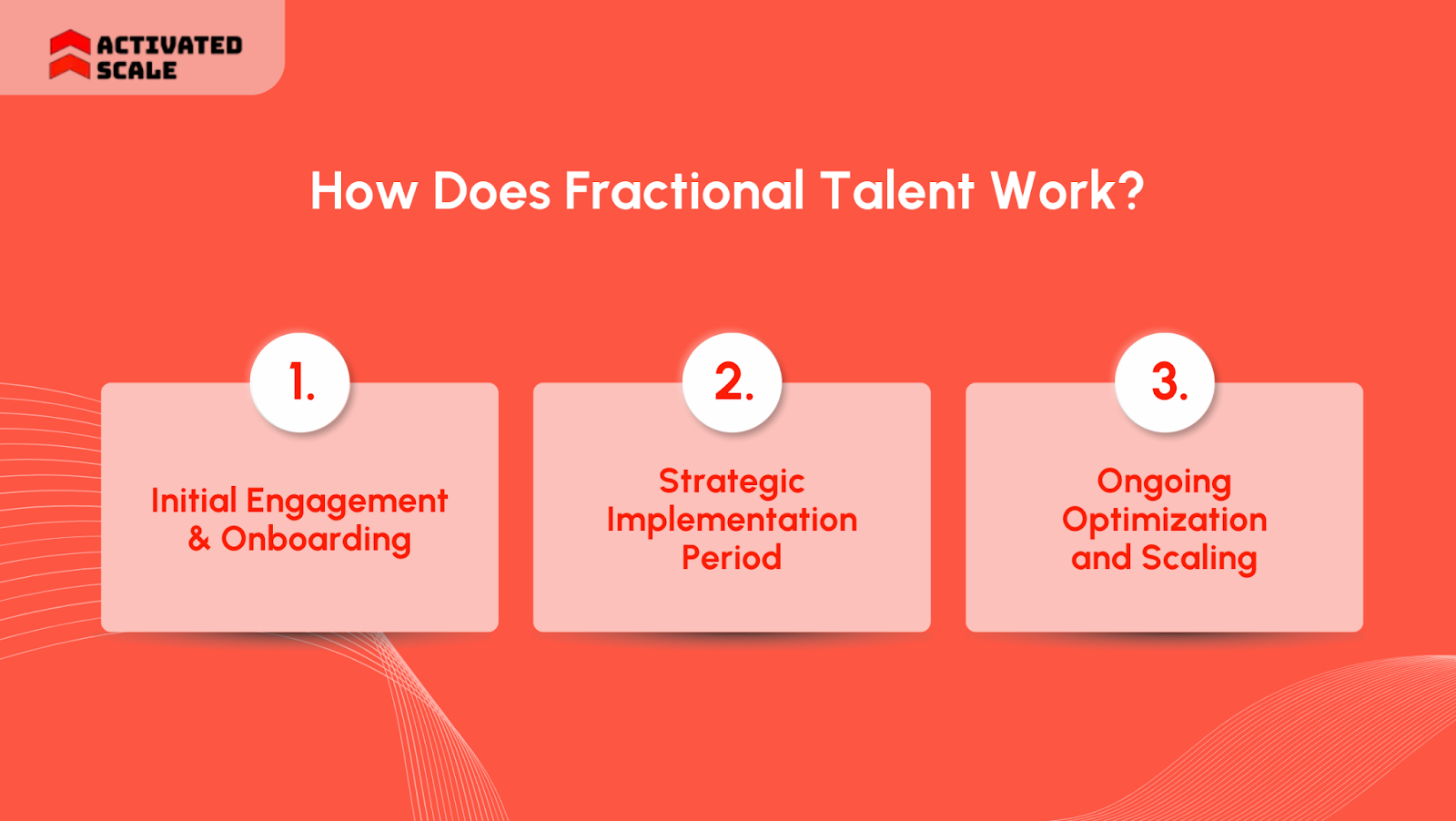
Fractional talent operates through structured, ongoing relationships between experienced professionals and multiple client companies. The process involves three key phases that create value for both parties.
1. Initial Engagement and Onboarding
Companies identify specific expertise gaps and connect with fractional professionals through specialized platforms or networks. The fractional expert conducts discovery sessions to learn business needs, current challenges, and strategic goals. This phase typically takes 1-2 weeks and establishes clear expectations, deliverables, and communication protocols.
2. Strategic Implementation Period
Fractional professionals focus on high-impact activities that drive measurable results within their designated roles. For instance, a fractional VP of Sales might spend weeks 2-8 developing sales processes, training existing team members, and establishing performance metrics. They work predetermined hours each week, splitting time between strategic planning and hands-on execution.
3. Ongoing Optimization and Scaling
After initial implementation, fractional talent shifts into maintenance and growth mode. They monitor performance metrics, adjust strategies based on results, and scale involvement up or down based on company needs. This flexibility allows businesses to increase fractional hours during growth phases or reduce them during quieter periods.
The compensation structure typically combines monthly retainers with performance-based incentives. Most fractional arrangements include clear success metrics and regular check-ins to maintain alignment between activities and business objectives.
Knowing which specific roles work best helps you make smart decisions about where to apply this model.
What Types of Roles Work Best Fractionally?
Certain positions naturally fit fractional arrangements, while others require full-time dedication. Recognizing which roles excel in fractional settings helps you make effective hiring decisions.
Different role types have varying success rates and practical considerations when implemented fractionally. Here's how major business functions typically perform:
Let's explore the roles that work particularly well in fractional arrangements:
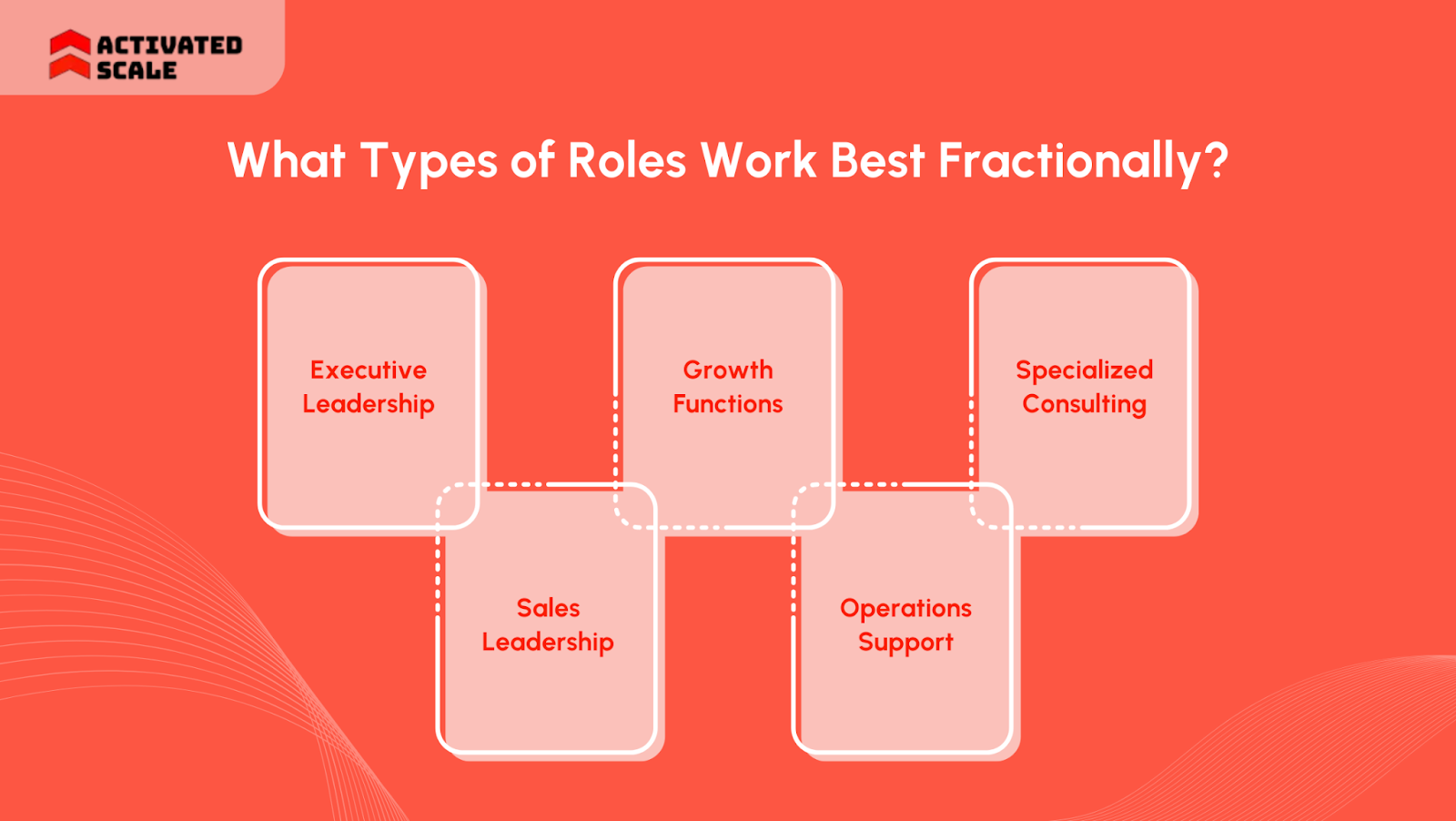
1. Executive Leadership Positions
C-level roles like Chief Marketing Officer, Chief Financial Officer, and Chief Revenue Officer excel as fractional positions. These roles focus on strategy, planning, and high-level decision-making rather than constant management. Fractional executives can establish frameworks, guide teams, and drive strategic initiatives without daily presence.
2. Sales Leadership and Development Roles
Fractional sales positions consistently deliver strong results across different business types. Fractional VPs of Sales build go-to-market strategies, establish processes, and train teams. Fractional Sales Development Representatives and Account Executives drive pipeline growth and close deals on flexible schedules.
3. Marketing and Growth Functions
Digital marketing, content strategy, and growth roles translate well to fractional work. These positions involve campaign development, content creation, and performance optimization. All these activities are managed remotely, and you can measure them through clear metrics. Fractional marketing leaders develop strategies and oversee execution without daily oversight.
4. Finance and Operations Support
Fractional CFOs and operations managers help establish financial controls, reporting systems, and operational processes. These roles require periodic intensive work followed by monitoring phases, making them ideal for fractional engagement. Companies get executive-level expertise without ongoing full-time costs.
5. Specialized Consulting Areas
Technical roles like cybersecurity, legal compliance, and business development work effectively as fractional positions. These specialties often require deep expertise applied intermittently rather than constant attention. Fractional specialists address specific challenges, implement solutions, and provide ongoing guidance as needed.
Once you know which roles fit your needs, the next step involves finding and evaluating the right talent.
How to Evaluate and Select Fractional Talent?
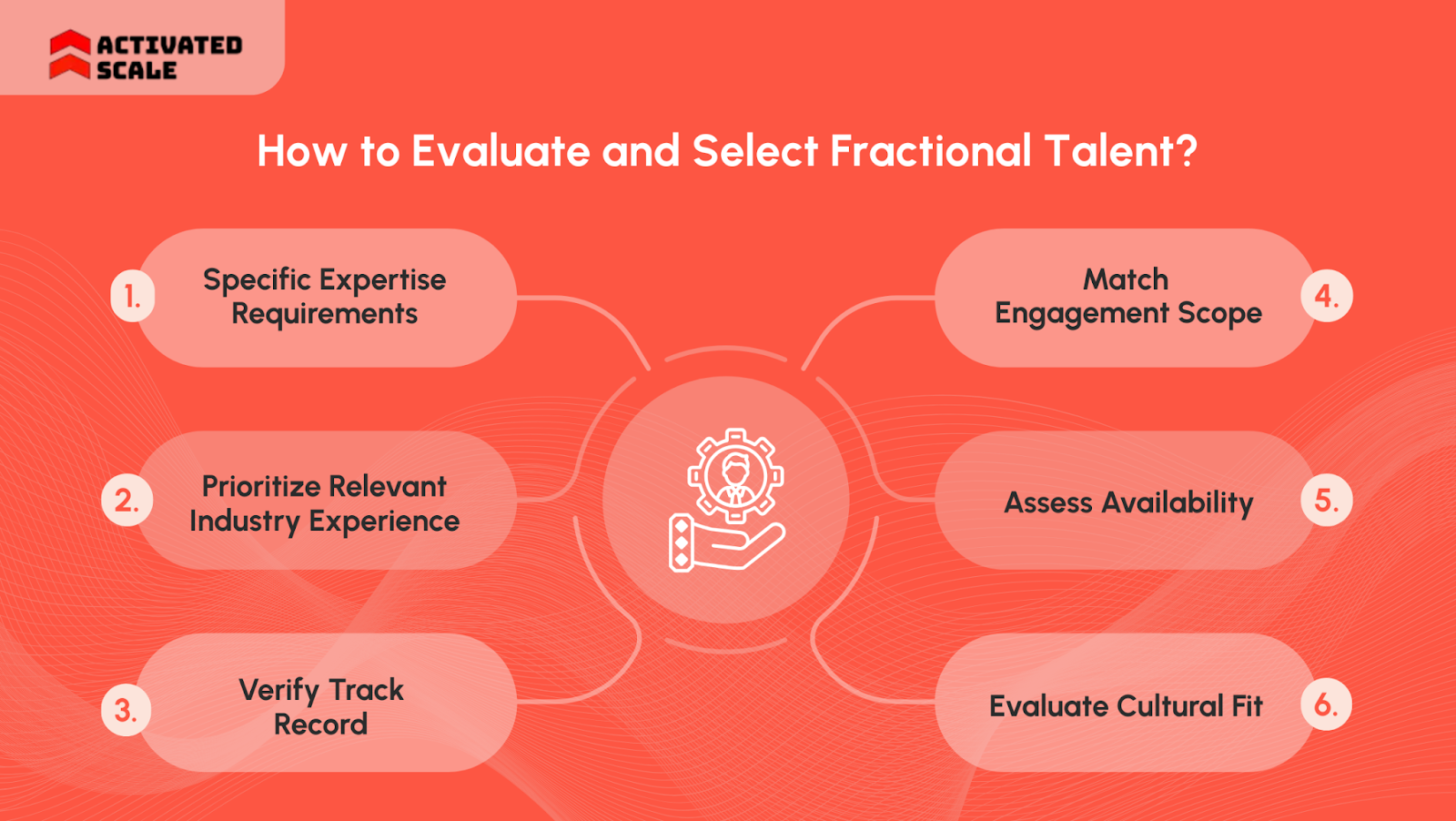
Choosing effective fractional talent requires a strategic evaluation of both business needs and candidate qualifications. The right selection can accelerate growth significantly while poor choices waste resources and delay progress.
- Define specific expertise requirements: Start by identifying exactly what knowledge or skills your business lacks. For instance, decide if you need a fractional sales leader to build processes from scratch or an experienced closer to handle enterprise deals.
- Prioritize relevant industry experience: Focus on fractional professionals with direct experience in your industry or similar business models. Industry-specific knowledge accelerates results and reduces learning curves significantly.
- Verify track record and measurable results: Request specific examples of concrete outcomes from previous fractional engagements.
- Match engagement scope to business stage: Early-stage companies need fractional talent focused on building foundations, whereas growth-stage businesses require fractional experts who can optimize existing operations and manage the complexities that come with growth.
- Assess availability and commitment levels: Make sure fractional professionals can dedicate adequate time to your business needs.
- Evaluate cultural fit and communication style: Fractional talent must integrate smoothly with existing teams despite limited time commitments. Assess communication preferences, working styles, and cultural alignment during initial conversations.
After selecting fractional talent, managing them effectively becomes critical to getting the results you want.
Tips to Effectively Work with Fractional Talent
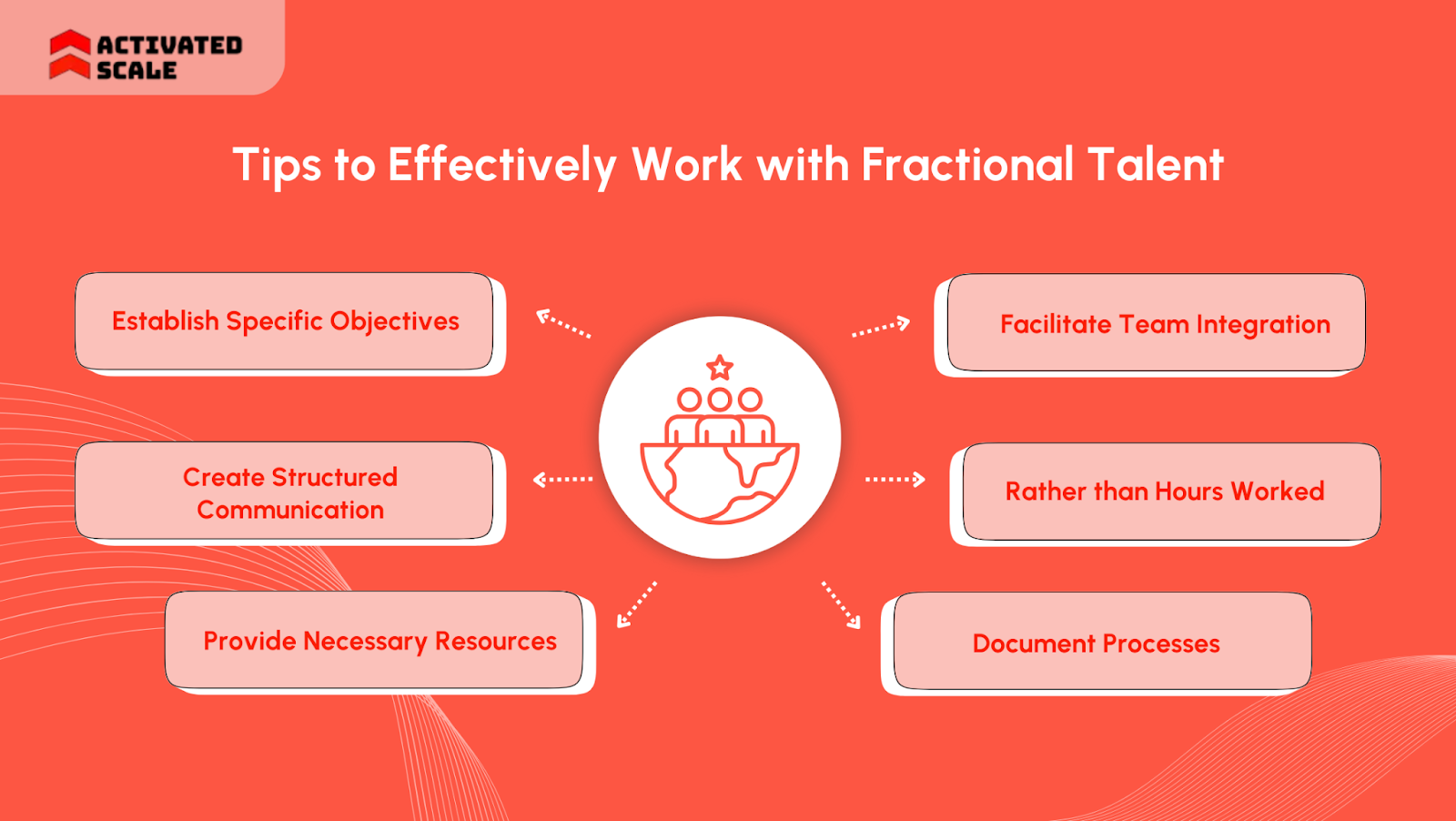
Successfully working with fractional talent requires different management approaches compared to traditional employees. Clear structure and communication protocols help fractional professionals deliver maximum value within limited time commitments.
- Establish specific objectives and success metrics: Define measurable goals for fractional engagements from the start.
- Create structured communication: Schedule regular check-ins and progress reviews to maintain alignment and momentum.
- Provide necessary resources and system access: Make sure fractional talent has appropriate tools, systems access, and information needed to perform effectively.
- Facilitate team integration: Enable smooth collaboration between fractional professionals and full-time team members.
- Focus on outcomes rather than hours worked: Manage fractional talent based on results rather than time spent working.
- Document processes and knowledge transfer: Capture processes, decisions, and insights developed by fractional professionals to make sure continuity continues.
Now, let’s see how you can connect with vetted fractional professionals who can start driving results immediately.
Access Top Fractional Expertise with Activated Scale
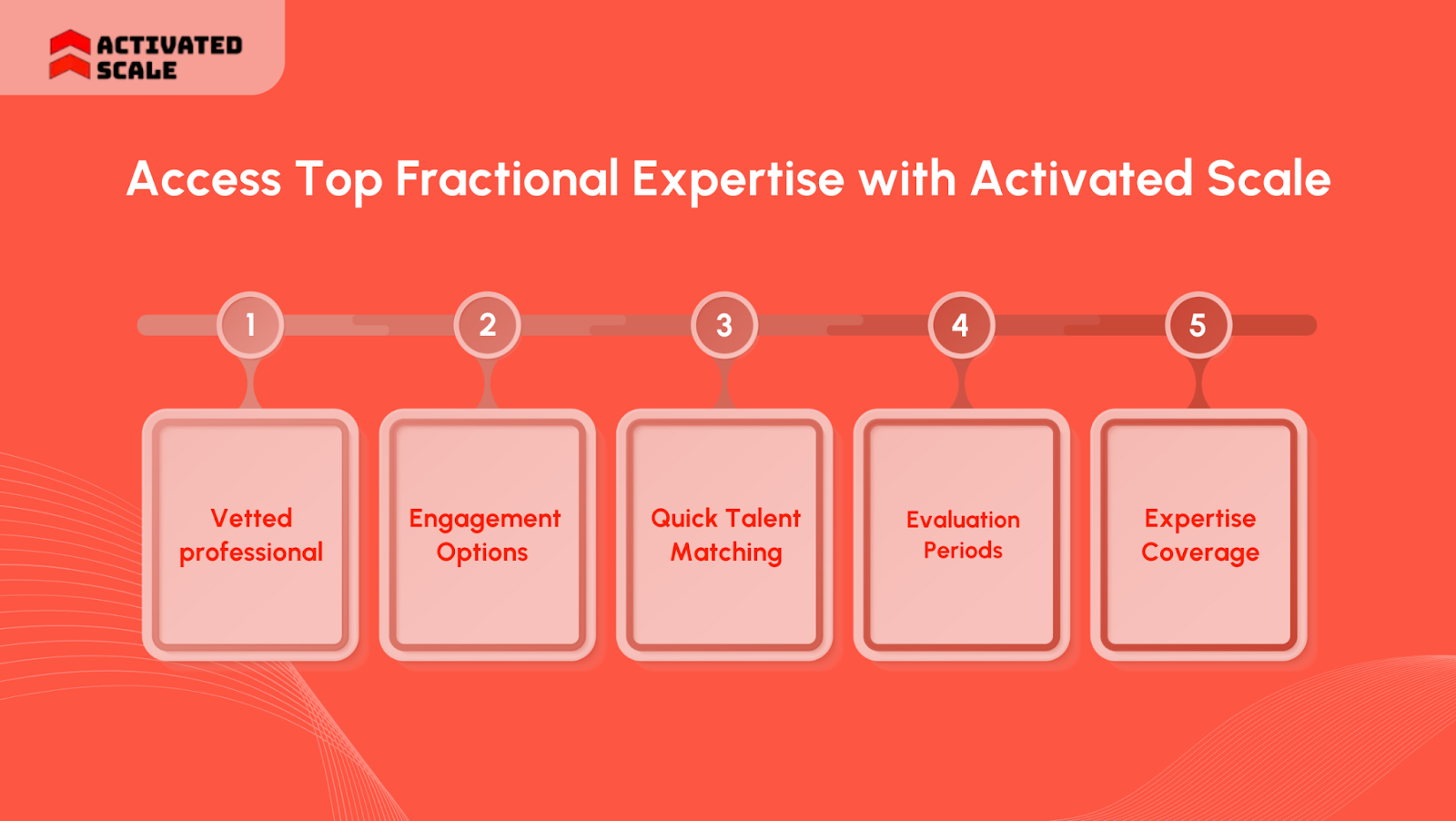
Building effective teams traditionally requires months of interviewing, training, and hoping new hires can actually perform. Most startups and growing companies can't afford those delays or expensive hiring mistakes that average thousands in lost productivity and replacement costs.
Activated Scale solves these problems by connecting you with pre-vetted, experienced fractional professionals who deliver results from day one. Here’s how Activated Scale can help you:
- Vetted professionals: Access experienced talent who have worked with your buyer types at similar deal sizes, reducing ramp time and increasing success probability through proven industry expertise.
- Flexible engagement options: Choose from fractional, contract-to-hire, or full-time arrangements based on current needs and budget constraints, with the ability to adjust involvement as your business grows.
- Quick talent matching: Connect with qualified candidates within 7 days, sometimes within 48 hours, bypassing lengthy traditional hiring processes that can take 3-6 months.
- Risk-free evaluation periods: Test skills, cultural fit, and performance before making long-term commitments, reducing costly hiring mistakes while making sure alignment with your objectives.
- Complete expertise coverage: From outbound prospecting and lead qualification to enterprise deal closing and team leadership, access specific skills your business needs at any growth stage.
Whether you need fractional SDRs to fill your pipeline, experienced AEs to close enterprise deals, or a fractional VP to build your entire go-to-market strategy, Activated Scale helps you access revenue-driving talent without traditional hiring risks and delays.
Final Thoughts
Fractional talent represents a strategic shift in how smart companies access specialized expertise without traditional hiring constraints. The model provides senior-level professionals who deliver executive results at significantly lower costs than full-time positions while offering flexibility to adjust based on business needs.
Companies using fractional talent report faster ramp times, higher success rates, and reduced hiring risks compared to traditional approaches. This model works particularly well for strategic roles where experienced professionals can immediately implement proven frameworks and drive measurable growth.
Ready to experience fractional talent advantages for your organization? Activated Scale connects you with vetted fractional professionals who start delivering results fast. Book a call to discuss your specific needs today.
FAQs
1. What's the main difference between fractional talent and freelancers?
Fractional talent works in strategic, ongoing roles at executive levels across multiple clients. Freelancers handle specific projects with defined timelines, focusing on tactical execution rather than sustained strategic leadership.
2. How do I make sure fractional professionals stay committed to my business?
Select fractional talent with proven track records and establish clear success metrics upfront. Structure compensation with performance incentives and maintain regular communication schedules to keep alignment with business objectives.
3. What's the typical engagement duration for fractional talent?
Most fractional arrangements last 6-18 months, though successful relationships often extend longer. Duration depends on business needs, project scope, and mutual satisfaction with results achieved during the engagement period.
4. How should I measure success with fractional talent?
Define specific, measurable objectives before engagements begin based on role requirements. Track relevant metrics like revenue growth, process improvements, or cost savings depending on the position, with regular performance reviews to ensure value delivery.
5. Can I convert fractional talent to full-time employees later?
Many fractional professionals consider full-time opportunities with successful client relationships. This approach allows you to evaluate skills, cultural fit, and performance before making permanent offers, significantly reducing hiring risks and improving long-term success rates.
The Ultimate Guide to Hiring a Salesperson!
Get the step-by-step guide to hiring, onboarding, and ensuring success!
_edi.png)




